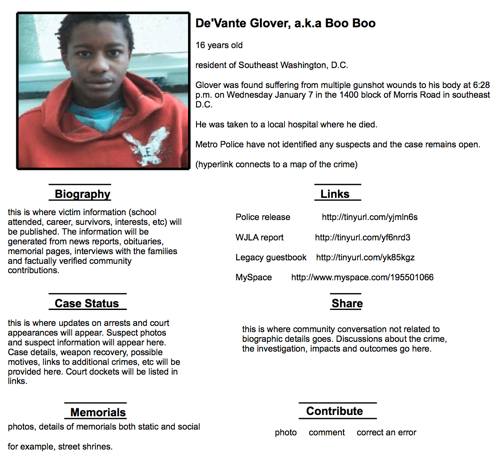![]() [EDITOR’S NOTE: We’re highlighting a few of the entries in this year’s Knight News Challenge, which just closed Tuesday night. Did you know of an entry worth looking at? Email Mac or leave a brief comment on this post. —Josh]
[EDITOR’S NOTE: We’re highlighting a few of the entries in this year’s Knight News Challenge, which just closed Tuesday night. Did you know of an entry worth looking at? Email Mac or leave a brief comment on this post. —Josh]
Laura Norton honed her crime-reporting skills in two years as a cops reporter at the Santa Rosa Press-Democrat. Now Norton, a freelancer in Washington, D.C., wants to build a new way to gather information on that city’s murders. (There have been 135 D.C. homicides so far in 2009.)
With Homicide Watch D.C., she wants to aggregate a variety of web-based resources — everything from official court documents to news reports to posts on Facebook and MySpace — and then create layers of context through original reporting. And here’s the hook: All that information will be constructed around the victims, not the crimes.
What she’s proposing is a mashup of crime visualizations, homicide blogs, social media tools, and the online gathering places offered by the likes of Legacy.com. The “victim pages” would be driven by an extensive database custom built for the project. Here’s a rough prototype from Norton’s proposal, built around De’Vante Glober, a 16-year-old shot and killed on Jan. 7:

There’s a public service component to this as well. News organizations can’t cover every homicide, and they rarely go beyond cursory details on the few stories that do bubble up. This project attempts to fill that coverage gap for the people who need it most: family members and neighbors.
“I think that when a crime happens in a neighborhood, people search for this,” Norton said. “And when you have a homicide every three days, which is what D.C. averaged the first half of the year, news organizations can’t get to that so easily.”